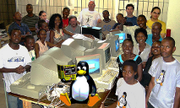The Case of SchoolNet Namibia
| Free/Libre Software Case Study | |
|---|---|
| The Case of SchoolNet Namibia | |
| Home | Introduction | History | SchoolNet in Namibia | Operations | Valuation | Status | Learning | Future | Conclusions | Acknowledgements | Appendices | Questions |
| SchoolNet in Namibia | Role | Partnerships | Community-based | Policy | Challenges | Services |
| Operations | Overview | Approach | Activities | Innovation | Synergies | Impact |
| Activities | Engaging Schools | Procurement | Servicing Used Computers | Connectivity | Software | Educational Resources | Deployment | Power | Support | Training | Advocacy |
SchoolNet Namibia (2000-2009), established as a not-for-gain organisation in February 2000, became well known for its work in the schools of Namibia.
In partnership with organisations from the public, private and civil sectors, as well as international agencies and educational institutions, SchoolNet internet-enabled schools and developed a model for doing this sustainably in the most difficult of Namibian conditions.
In the interests of equality, digital inclusion and self-determination for the people of Namibia, the model featured libre software and prioritised free and open educational resources to maximise the extent to which these could be copied, adapted for local needs and shared for community benefit. Free of restrictions and with no licensing fees, such “libre resources” also have advantages in terms cost-reduction and scalability.
Overcoming the challenges associated with remote and under-resourced schools took some ingenuity and innovation. Sustainability rested on local capacity-building focusing on out-of-school youth who reaped benefits beyond their time with SchoolNet as volunteers.
In pursuit of the vision (above), an unprecedented negotiation with the national telecommunications operator secured an agreement on an affordable subsidised flat rate for internet access for schools.
SchoolNet lasted a decade touching the lives of thousands of young Namibians and inspiring advocates of free software in education by demonstrating that it can be done.
The legacy of SchoolNet Namibia lives on through this case study, countless articles, blog and mailing list postings, and in projects around the world informed and inspired by its success. This case study describes the broad activities of SchoolNet Namibia, how it worked, and consolidates the experience-based learning for students of free software and ICT4D.
| SchoolNet Namibia | |
| Wikipedia has an article on this subject.
Visit SchoolNet Namibia for more in depth information |
See also: Namibia and SchoolNet Namibia
